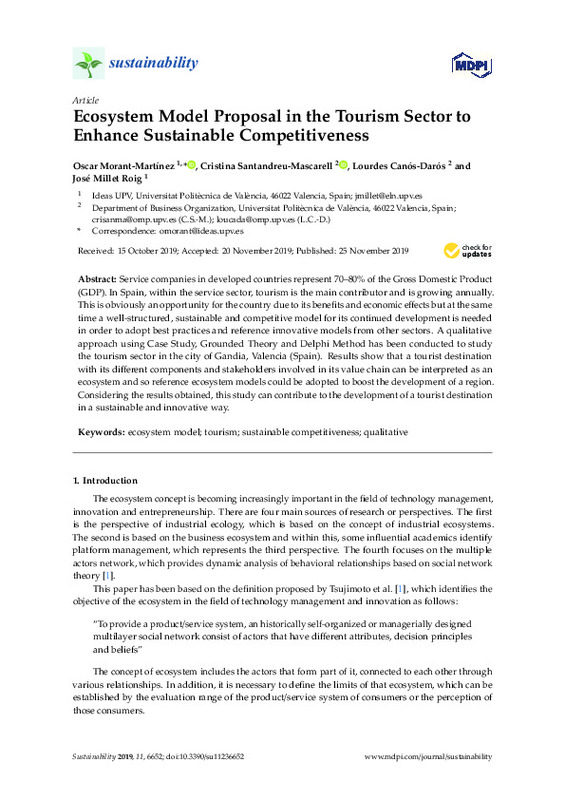JavaScript is disabled for your browser. Some features of this site may not work without it.
Buscar en RiuNet
Listar
Mi cuenta
Estadísticas
Ayuda RiuNet
Admin. UPV
Ecosystem Model Proposal in the Tourism Sector to Enhance Sustainable Competitiveness
Mostrar el registro sencillo del ítem
Ficheros en el ítem
| dc.contributor.author | Morant-Martínez, Oscar
|
es_ES |
| dc.contributor.author | Santandreu Mascarell, Cristina
|
es_ES |
| dc.contributor.author | Canós-Darós, Lourdes
|
es_ES |
| dc.contributor.author | Millet Roig, José
|
es_ES |
| dc.date.accessioned | 2021-02-06T04:33:06Z | |
| dc.date.available | 2021-02-06T04:33:06Z | |
| dc.date.issued | 2019-12 | es_ES |
| dc.identifier.uri | http://hdl.handle.net/10251/160811 | |
| dc.description.abstract | [EN] Service companies in developed countries represent 70-80% of the Gross Domestic Product (GDP). In Spain, within the service sector, tourism is the main contributor and is growing annually. This is obviously an opportunity for the country due to its benefits and economic e¿ects but at the same time a well-structured, sustainable and competitive model for its continued development is needed in order to adopt best practices and reference innovative models from other sectors. A qualitative approach using Case Study, Grounded Theory and Delphi Method has been conducted to study the tourism sector in the city of Gandia, Valencia (Spain). Results show that a tourist destination with its different components and stakeholders involved in its value chain can be interpreted as an ecosystem and so reference ecosystem models could be adopted to boost the development of a region. Considering the results obtained, this study can contribute to the development of a tourist destination in a sustainable and innovative way. | es_ES |
| dc.language | Inglés | es_ES |
| dc.publisher | MDPI AG | es_ES |
| dc.relation.ispartof | Sustainability | es_ES |
| dc.rights | Reconocimiento (by) | es_ES |
| dc.subject | Ecosystem model | es_ES |
| dc.subject | Tourism | es_ES |
| dc.subject | Sustainable competitiveness | es_ES |
| dc.subject | Qualitative | es_ES |
| dc.subject.classification | ORGANIZACION DE EMPRESAS | es_ES |
| dc.subject.classification | TECNOLOGIA ELECTRONICA | es_ES |
| dc.title | Ecosystem Model Proposal in the Tourism Sector to Enhance Sustainable Competitiveness | es_ES |
| dc.type | Artículo | es_ES |
| dc.identifier.doi | 10.3390/su11236652 | es_ES |
| dc.rights.accessRights | Abierto | es_ES |
| dc.contributor.affiliation | Universitat Politècnica de València. Departamento de Organización de Empresas - Departament d'Organització d'Empreses | es_ES |
| dc.contributor.affiliation | Universitat Politècnica de València. Departamento de Ingeniería Electrónica - Departament d'Enginyeria Electrònica | es_ES |
| dc.description.bibliographicCitation | Morant-Martínez, O.; Santandreu Mascarell, C.; Canós-Darós, L.; Millet Roig, J. (2019). Ecosystem Model Proposal in the Tourism Sector to Enhance Sustainable Competitiveness. Sustainability. 11(23):1-15. https://doi.org/10.3390/su11236652 | es_ES |
| dc.description.accrualMethod | S | es_ES |
| dc.relation.publisherversion | https://doi.org/10.3390/su11236652 | es_ES |
| dc.description.upvformatpinicio | 1 | es_ES |
| dc.description.upvformatpfin | 15 | es_ES |
| dc.type.version | info:eu-repo/semantics/publishedVersion | es_ES |
| dc.description.volume | 11 | es_ES |
| dc.description.issue | 23 | es_ES |
| dc.identifier.eissn | 2071-1050 | es_ES |
| dc.relation.pasarela | S\400751 | es_ES |
| dc.description.references | Tsujimoto, M., Kajikawa, Y., Tomita, J., & Matsumoto, Y. (2018). A review of the ecosystem concept — Towards coherent ecosystem design. Technological Forecasting and Social Change, 136, 49-58. doi:10.1016/j.techfore.2017.06.032 | es_ES |
| dc.description.references | Simatupang, T. M., Schwab, A., & Lantu, D. (2015). Introduction: Building Sustainable Entrepreneurship Ecosystems. SSRN Electronic Journal. doi:10.2139/ssrn.3161598 | es_ES |
| dc.description.references | Stel, A. van, Carree, M., & Thurik, R. (2005). The Effect of Entrepreneurial Activity on National Economic Growth. Small Business Economics, 24(3), 311-321. doi:10.1007/s11187-005-1996-6 | es_ES |
| dc.description.references | About Daniel Isenberghttps://www.babson.edu/academics/executive-education/expanding-entrepreneurship/babson-entrepreneurship-ecosystem-platform/daniel-isenberg/ | es_ES |
| dc.description.references | Brekke, T. (2015). Entrepreneurship and path dependency in regional development. Entrepreneurship & Regional Development, 27(3-4), 202-218. doi:10.1080/08985626.2015.1030457 | es_ES |
| dc.description.references | Garud, R., Kumaraswamy, A., & Karnøe, P. (2009). Path Dependence or Path Creation? Journal of Management Studies, 47(4), 760-774. doi:10.1111/j.1467-6486.2009.00914.x | es_ES |
| dc.description.references | Mason, C. M., & Harrison, R. T. (2006). After the exit: Acquisitions, entrepreneurial recycling and regional economic development. Regional Studies, 40(1), 55-73. doi:10.1080/00343400500450059 | es_ES |
| dc.description.references | Instituto Nacional de Estadísticahttps://www.ine.es | es_ES |
| dc.description.references | Gandia es el Undécimo Destino Con Mejor Ocupación Hotelera de Toda Españahttps://www.lasprovincias.es/safor/gandia-undecimo-destino-20191107011433-ntvo.html?fbclid=IwAR1vvgBcROmlD-hVkWnZ2D31LNpor8OX2XW7Rkeaznn0xccPsZXOfNTqSI0 | es_ES |
| dc.description.references | Chetty, S. (1996). The Case Study Method for Research in Small-and Medium-Sized Firms. International Small Business Journal: Researching Entrepreneurship, 15(1), 73-85. doi:10.1177/0266242696151005 | es_ES |
| dc.description.references | Partington, D. (2000). Building Grounded Theories of Management Action. British Journal of Management, 11(2), 91-102. doi:10.1111/1467-8551.00153 | es_ES |
| dc.description.references | Sabater, J. J. G., & Garcia, J. A. M. (2011). Can we still talk about continuous improvement? Rethinking enablers and inhibitors for successful implementation. International Journal of Technology Management, 55(1/2), 28. doi:10.1504/ijtm.2011.041678 | es_ES |
| dc.description.references | Santandreu-Mascarell, C., Canós-Darós, L., & Pons-Morera, C. (2011). Competencies and skills for future Industrial Engineers defined in Spanish degrees. Journal of Industrial Engineering and Management, 4(1). doi:10.3926/jiem.2011.v4n1.p13-30 | es_ES |
| dc.description.references | Pace, S. (2004). A grounded theory of the flow experiences of Web users. International Journal of Human-Computer Studies, 60(3), 327-363. doi:10.1016/j.ijhcs.2003.08.005 | es_ES |
| dc.description.references | Loo, R. (2002). The Delphi method: a powerful tool for strategic management. Policing: An International Journal of Police Strategies & Management, 25(4), 762-769. doi:10.1108/13639510210450677 | es_ES |
| dc.description.references | Okoli, C., & Pawlowski, S. D. (2004). The Delphi method as a research tool: an example, design considerations and applications. Information & Management, 42(1), 15-29. doi:10.1016/j.im.2003.11.002 | es_ES |
| dc.description.references | Grisham, T. (2009). The Delphi technique: a method for testing complex and multifaceted topics. International Journal of Managing Projects in Business, 2(1), 112-130. doi:10.1108/17538370910930545 | es_ES |
| dc.description.references | Crouch, G. I., & Ritchie, J. R. B. (1999). Tourism, Competitiveness, and Societal Prosperity. Journal of Business Research, 44(3), 137-152. doi:10.1016/s0148-2963(97)00196-3 | es_ES |
| dc.description.references | Invertir—Gandia Empresarialhttp://gandiaempresarial.com/invertir/ | es_ES |








